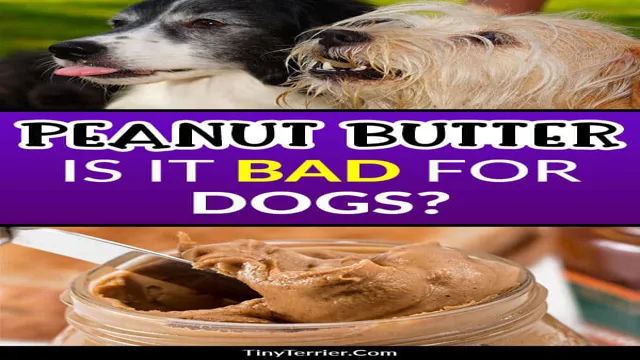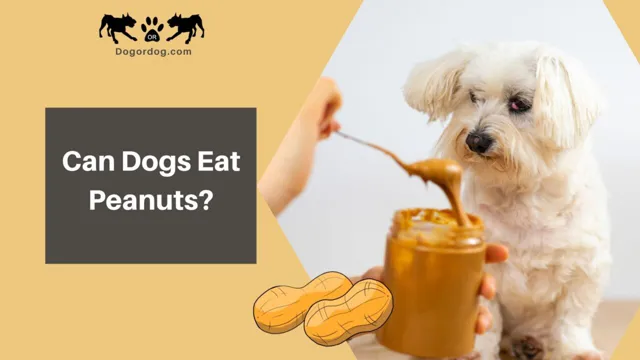Is It Safe for Dogs to Eat Peanut Butter? An In-Depth Look

Are you wondering if it’s safe to give your beloved pooch a spoonful of peanut butter? Many dog owners are unsure if peanut butter is a safe treat for their furry friends. The truth is, in moderation, dogs can enjoy a spoonful or two of peanut butter as an occasional treat. However, there are some important things to consider before offering your pup a creamy snack. In this blog post, we’ll discuss the potential benefits and risks of feeding your dog peanut butter, as well as provide some tasty, healthy alternatives.
Is Peanut Butter Good for Dogs?
As pet owners, it’s natural to want to share snacks with our beloved companions, but can dogs eat regular peanut butter? The answer is, usually yes. Peanut butter can be a great source of protein and healthy fats for your pup, but there are a few things to look out for. Stick to all-natural, unsweetened, and unsalted varieties to avoid added sugar and salts, which can be harmful to dogs. Also, check the ingredients for xylitol, a sugar substitute that is toxic to dogs. Peanut butter is a great treat for dogs, but it should only be given in moderation.
Too much of a good thing can lead to weight gain and gastrointestinal upset. A tablespoon per day is plenty for a medium-sized dog. If your dog loves peanut butter, you can use it as a reward or a distraction. Spread a small amount on a toy that your pup can lick or give them a frozen peanut butter-filled Kong as a special treat. Peanut butter can also be used as a training aid.
You can spread a small amount on a treat dispensing toy or a toy that requires your pup to solve a puzzle to get the reward. This is a great way to keep your pup busy and mentally stimulated. So, can dogs eat regular peanut butter? Yes, as long as it is all-natural, unsweetened, and unsalted. However, it should be given in moderation and only as a special treat. If you’re not sure if your pup will like peanut butter, it’s always best to consult with your veterinarian first.
Benefits of Peanut Butter
Peanut butter can be a delicious and nutritious snack for humans, but can dogs eat normal peanut butter too? The answer is yes! Although any food should be given to dogs in moderation, there are several health benefits that make peanut butter a great snack for your furry friend. Peanut butter is packed with protein and healthy fats, which help to keep your pup’s coat shiny and their skin healthy. Additionally, the high levels of vitamins B, E, and niacin found in peanut butter can help boost your pup’s immune system, while the magnesium and potassium promote healthy muscle growth. Peanut butter also contains a good deal of fiber, which helps to keep your pup regular. All in all, peanut butter is a great snack for your pup that can provide many health benefits.

Risks of Peanut Butter
When it comes to our canine companions, it’s easy to want to share our favorite snacks with them. But when it comes to peanut butter, it can be a dangerous snack. While dogs can eat peanut butter, it’s important to understand the risks of feeding them this popular treat. Peanut butter contains high amounts of fat and calories, which can lead to weight gain and potentially pancreatitis if fed in excess. Additionally, some brands may contain xylitol, an artificial sweetener toxic to dogs.
To be on the safe side, look for peanut butters that are natural, organic, and do not contain any added sugar or xylitol.
Peanut Butter Alternatives
Peanut butter has been a staple in many households for years. It’s a delicious, creamy spread that can be added to so many dishes and snacks. But did you know that not all peanut butters are safe for your furry companion? No matter how much your dog may beg for a spoonful of your peanut butter, it’s important to know that regular peanut butter can be dangerous for our canine friends. Peanut butter contains an ingredient called xylitol, which is a sugar alcohol that is toxic to dogs. Xylitol can cause a rapid drop in blood sugar levels, resulting in seizures and possibly death.
So, what are some safe, tasty alternatives for your pup? One of the most popular alternatives is pumpkin butter. Not only is it full of antioxidants and vitamins, but it’s also low in sugar and fat, making it a healthier choice than peanut butter. It’s also safe for dogs to eat and makes a great topping for their dinner. Another great peanut butter alternative is sunflower seed butter. This spread is made from roasted sunflower seeds and is free of xylitol.
It’s high in healthy fats and is a great source of protein, making it a great choice for your pup. Sunflower seed butter is also easy to spread on toast or crackers and is a great, healthy snack for your pup. If you’re looking for a more traditional spread, almond butter is also a great option for your pup. Almond butter is high in protein and healthy fats and doesn’t contain any xylitol. It’s a great choice for your pup’s dinner or as a healthy snack.
No matter which alternative you choose, it’s important to remember to always check the ingredients list to make sure there’s no xylitol. With these tasty and safe alternatives, you and your pup can still enjoy a yummy snack without any of the worry.
Nut Butters
It’s a common question from pet owners: Can dogs eat normal peanut butter? The answer is yes, but with one major caveat. Peanut butter is safe for dogs to eat in moderation, but many brands of peanut butter contain high amounts of sugar and salt, both of which can be harmful to a dog’s health if consumed in excess. So if you want to give your pup a peanut butter treat, make sure to choose an unsalted and unsweetened variety.
Fruits and Vegetables
When it comes to choosing snacks for your canine companion, it can be hard to know what is safe and what isn’t. One popular snack that many pet owners give their dogs is peanut butter, but the question remains: can dogs eat normal peanut butter? The short answer is yes, but with a few caveats. Peanut butter is a great source of protein and healthy fats, and it can be a nice occasional treat for your pup. However, it’s important to make sure you’re giving them a natural peanut butter without any added sugars, artificial sweeteners, or hydrogenated oils. Also, make sure the peanut butter doesn’t contain xylitol, as this is a sugar substitute that is toxic to dogs.
Finally, don’t overdo it – a small spoonful should be enough to give your pup a tasty snack.

High-Protein Treats
Are you looking for some high-protein treats for your beloved pup? Well, look no further – you may already have the answer in your pantry! Normal peanut butter can be a great source of protein for dogs, and it’s a tasty treat too! One tablespoon of peanut butter can contain up to 02 grams of protein, but it’s important to make sure the peanut butter you give your pup is free from added sugar and salt, as this can cause health issues. So, next time you’re looking for a tasty, high-protein treat for your pup, reach for the peanut butter jar!
Conclusion
No, dogs cannot eat peanut butter that is intended for human consumption. Peanut butter made specifically for dogs is available and is generally safer for them to eat. So, if you want to treat your pup to a tasty snack, make sure to get them their own peanut butter!”
FAQs
Can dogs eat normal peanut butter?
Yes, dogs can eat normal peanut butter, but it should be served in moderation. Peanut butter can be a healthy treat for dogs, as long as it does not contain xylitol, a sugar substitute that is toxic to dogs.




